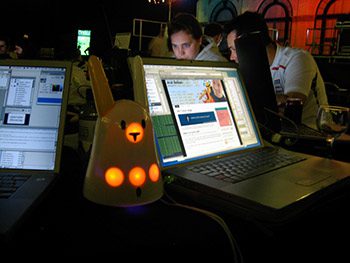
Only in London does a programming conference get interrupted by a downpour of rain — indoors.
Hundreds of geeks gathered for Hack Day London at the huge Alexandra Palace broke out umbrellas Saturday to stop laptops from getting soaked when rain poured in through the roof. A lightning strike had shorted circuits and opened the building’s electronically controlled skylights.
Not that local webmonkeys didn’t display their creative ingenuity to stop the event from being a washout.
In a building twice rebuilt after fire and once used as a jamming station to disrupt Nazi radio transmissions, plucky programmers kept their chins up by resorting to whiteboards and sheets of paper — a show of stoicism that provoked comparisons to the World War II spirit of the Blitz and Dunkirk.
“I learned something firsthand about the British ‘Dunkirk spirit’ that I had always heard about in history class, but never witnessed personally,” wrote one of the event’s organizers, Yahoo developer Chad Dickerson. “As water poured through the open vents in the roof, I saw several hackers quietly whip out their umbrellas and keep hacking away.”

Missed CSI: Miami? Wi-Fi-enabled bunny Nabaztag, when mashed together with the BBC’s TV listings XML file to make Nabazhack, serves as a handy desktop reminder.
The event at “Ally Pally,” as it’s known to locals, was a two-night sleepover for web geeks keen to get together and create impromptu web mashups.
Jointly organized by Yahoo and the BBC, Hack Day was the latest and largest on a burgeoning London developers’ calendar — attracting more than 500 hackers.
“The London tech scene is really rabid, it’s a very exciting scene here,” Dickerson told Wired News.
Small, informal gatherings and “unconferences” like London 2.0 and Oxford Geek Night allow creative British programmers to share ideas for new websites — and are helping to fuel a can-do startup culture driven not by business entrepreneurs but by webmonkeys. Hack Day London brought more of them together than ever before.
“This is easily the largest developer event in the city,” said Matt Cashmore, who works on the BBC’s Backstage effort to encourage development around the network’s content feeds. “It’s really happening, it’s a great social scene, bunches of dedicated guys get together.”
For Yahoo, which encourages third parties to harness its raw programming materials to make new projects, Hack Day is about more than just talking PHP over a pint of beer.
Letting enthusiasts spread underlying code for sites like Yahoo Answers or Yahoo Maps allows the portal to thread itself into the fabric of the web, casting the hundreds of programmers who camped out in sleeping bags as foot soldiers in the battle between Yahoo and rivals like Google, which has recognized the importance of such outreach with its own Developer Day. Such schemes, with their generous access to both code and content, point to the growing importance of the mashup programmer at the forefront of innovation.

Developers at Hack Day London find new friends with required skills to cobble together websites using existing APIs and a bit of added ingenuity.
Photo: Jérémi Joslin, CC Attribution 2.0 license/Flickr
Developers at Hack Day London find new friends with required skills to cobble together websites using existing APIs and a bit of added ingenuity.
Photo: Jérémi Joslin, CC Attribution 2.0 license/Flickr”If I ran a newspaper or any company right now, I’d definitely want to be hiring developers — I do think developers will inherit the earth,” Dickerson said, before selecting as Hack Day winner a mobile RSS and RFID mashup made by New York Times Labs researchers.
“I think some of the power comes from the simplicity of the new tools,” said Mike Jewell, a London-based developer who used Hack Day to build a capture-the-flag game that takes place over Skype and Twitter but gets players running to occupy the city’s distinctive red telephone boxes.
“Having that data available is really driving the creators,” he said. “Hopefully, eventually the development skills may become of secondary importance to the creativity.”